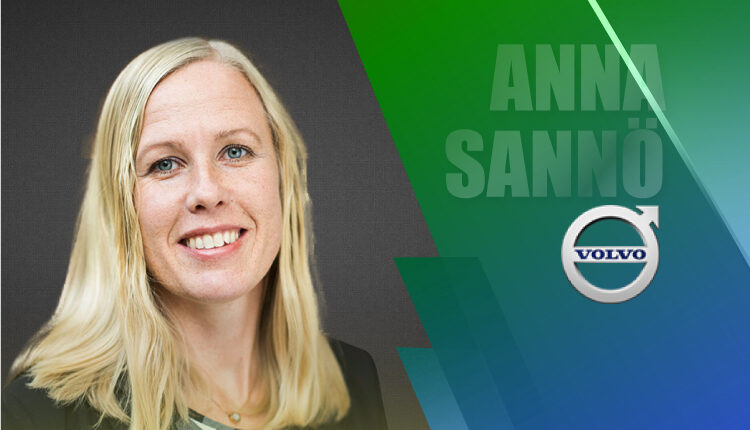Hi Anna please tell us about your role and the team/technology you handle at Volvo? How did you arrive here?
Hi, I am working as a Research Strategy Manager in our Advanced Engineering department, which entails managing our research portfolio with external partners, including collaboration with our partner universities linked to research. I also have a PhD in Innovation & Design focusing on sustainable development.
Could you tell us how Volvo CE is inspiring women engineers to take interest in their fields?
Volvo CE has for many years led a number of school collaboration activities, where we bring together budding female engineers across different age ranges and educate them about the skills they need to succeed. It is a chance for us to not only encourage these women to consider a career in the industry but also act as a mentor in offering any necessary support and guidance. We also think it’s important to nurture the female talent we have within our own organization, to empower networks of women engineers and provide a ‘role model’ structure so that women always have a voice and talent ahead of them to help them forge their own successful career paths. On a societal level, we think it’s so important to strive for a better balance – not only with gender, but across all other areas – because it benefits everyone to have more equal representation. And in the field of innovation, we believe it’s even more important as it’s vital to have all facets of society front of mind when solving some of society’s biggest challenges.
Tell us some of your recent gender equality campaigns?
One of our ongoing activities is Vera 2021, which we are rolling out now. It is a campaign where we collaborate with both universities and the schools in the regions around our Volvo CE locations in Eskilstuna and Hallsberg, in Sweden, to encourage more girls to consider a career in engineering. The workshops are based on researcher Ulrika Sultan’s findings, in which she has discovered that girls’ interest for technology drops around the age of 10-12. Our aim with Vera – a title named after Sweden’s first female engineer Vera Sandberg – is that we can reverse this trend. We started this initiative in 2019 in a physical workshop and it has proved successful, but now, due to Covid-19 we will be making it digital. The advantage with this new approach is that now even more companies and schools can take part and use the methodology.
How can companies use technology to motivate young girls to take up STEM?
The importance of engineering in shaping sustainable development is not always shared in media. And it’s a career option that can take a number of different routes – manufacturing, AI, design, computer science, the list is endless. It is a career we think is suited to people no matter what their gender, but what we can do as an organization is to go out and make sure that girls keep their doors open for later choosing engineering as a profession. In this program, we are using digital communication to bring girls together with female engineers, teachers and university students to collaborate on exciting engineering challenges. Technology is how we bring them together, but it is also the tool they need to solve some of society’s biggest challenges – challenges such as how to make recycling more fun or how to reduce food waste. We also make sure we communicate in a way that fosters greater participation, to encourage girls to come forward with their problem solving skills and make them confident in their engineering and technology capabilities.
Which specializations in the industry are best suited for young female students to start with? What kind of support do these young students seek from the enterprises.
I would say that any specializations are for women too, just as for men, but considering the rapid changes in society enabled by technology, the industry should encourage even greater inclusion in new technology areas such as automation, connectivity and electrification. These are the areas that are driving real change in our industry and beyond, so when we have the chance to influence change we should.
How is Volvo working with governments around the world to bring in gender equality at workplace / society? Any specific campaign you would like to mention here:
When it comes to gender equality, we are working with the UN’s Agenda 2030 in driving forwards more sustainable development. We always relate back to the UN’s sustainable development goals (SDG) framework in any new research projects, in order to ensure we are making a real impact for shaping the future and building the world we want to live in. We believe in passionately contributing to society’s prosperity and sustainable development, reducing the climate footprint and use of resources – always with people’s health, safety and wellbeing at the center of our actions.
Thank you, Anna! That was fun and hope to see you back on HR Technology soon.
Anna Sannö is Research Strategy Manager in the Advanced Engineering department of Volvo Construction Equipment (Volvo CE), where she specializes in collaborating with partner organizations with a focus on sustainable development. She also holds an Industrial PhD in Innovation and Product Realization from Mälardalen University and a BSc in Chemical Engineering from Chalmers Technical University. She has worked for Volvo CE and Volvo Technology since 2006

Volvo Construction Equipment (Volvo CE) is a major international company that develops, manufactures and markets equipment for construction and related industries. We don’t only offer a broad range of products, but also efficient worldwide service and a range of customer solutions in, for example, financing and used equipment.
With over 14,000 employees, Volvo CE is one of the largest companies in the industry. Our wide range of products and services are offered in more than 140 countries through our global distribution network.


